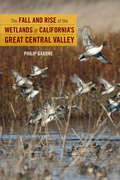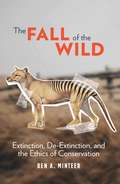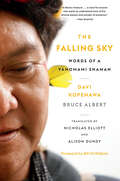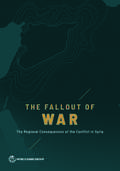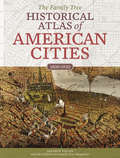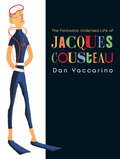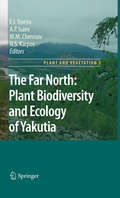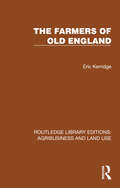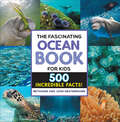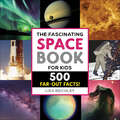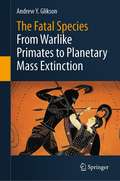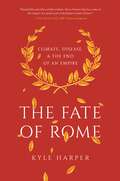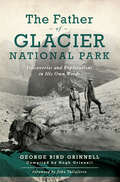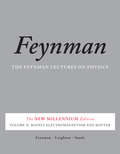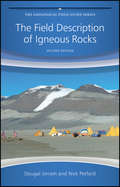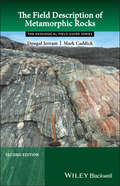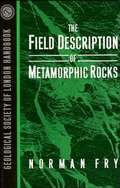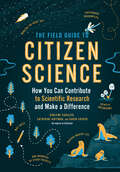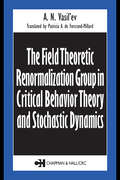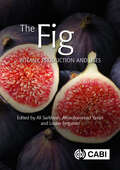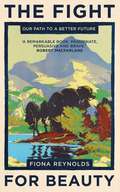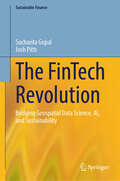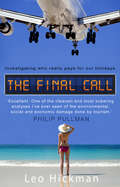- Table View
- List View
The Fall and Rise of the Wetlands of California's Great Central Valley
by Philip GaroneThis is the first comprehensive environmental history of California's Great Central Valley, where extensive freshwater and tidal wetlands once provided critical habitat for tens of millions of migratory waterfowl. Weaving together ecology, grassroots politics, and public policy, Philip Garone tells how California's wetlands were nearly obliterated by vast irrigation and reclamation projects, but have been brought back from the brink of total destruction by the organized efforts of duck hunters, whistle-blowing scientists, and a broad coalition of conservationists. Garone examines the many demands that have been made on the Valley's natural resources, especially by large-scale agriculture, and traces the unforeseen ecological consequences of our unrestrained manipulation of nature. He also investigates changing public and scientific attitudes that are now ushering in an era of unprecedented protection for wildlife and wetlands in California and the nation.
The Fall of the Wild: Extinction, De-Extinction, and the Ethics of Conservation
by Ben A. MinteerThe passenger pigeon, the great auk, the Tasmanian tiger—the memory of these vanished species haunts the fight against extinction. Seeking to save other creatures from their fate in an age of accelerating biodiversity loss, wildlife advocates have become captivated by a narrative of heroic conservation efforts. A range of technological and policy strategies, from the traditional, such as regulations and refuges, to the novel—the scientific wizardry of genetic engineering and synthetic biology—seemingly promise solutions to the extinction crisis.In The Fall of the Wild, Ben A. Minteer calls for reflection on the ethical dilemmas of species loss and recovery in an increasingly human-driven world. He asks an unsettling but necessary question: Might our well-meaning efforts to save and restore wildlife pose a threat to the ideal of preserving a world that isn’t completely under the human thumb? Minteer probes the tension between our impulse to do whatever it takes and the risk of pursuing strategies that undermine our broader commitment to the preservation of wildness. From collecting wildlife specimens for museums and the wilderness aspirations of zoos to visions of “assisted colonization” of new habitats and high-tech attempts to revive long-extinct species, he explores the scientific and ethical concerns vexing conservation today. The Fall of the Wild is a nuanced treatment of the deeper moral issues underpinning the quest to save species on the brink of extinction and an accessible intervention in debates over the principles and practice of nature conservation.
The Falling Sky: Words of a Yanomami Shaman
by Davi Kopenawa Bruce AlbertThe 10th anniversary editionA Guardian Best Book about DeforestationA New Scientist Best Book of the YearA Taipei Times Best Book of the Year“A perfectly grounded account of what it is like to live an indigenous life in communion with one’s personal spirits. We are losing worlds upon worlds.”—Louise Erdrich, New York Times Book Review“The Yanomami of the Amazon, like all the indigenous peoples of the Americas and Australia, have experienced the end of what was once their world. Yet they have survived and somehow succeeded in making sense of a wounded existence. They have a lot to teach us.”—Amitav Ghosh, The Guardian“A literary treasure…a must for anyone who wants to understand more of the diverse beauty and wonder of existence.”—New ScientistA now classic account of the life and thought of Davi Kopenawa, shaman and spokesman for the Yanomami, The Falling Sky paints an unforgettable picture of an indigenous culture living in harmony with the Amazon forest and its creatures, and its devastating encounter with the global mining industry. In richly evocative language, Kopenawa recounts his initiation as a shaman and first experience of outsiders: missionaries, cattle ranchers, government officials, and gold prospectors seeking to extract the riches of the Amazon.A coming-of-age story entwined with a rare first-person articulation of shamanic philosophy, this impassioned plea to respect indigenous peoples’ rights is a powerful rebuke to the accelerating depredation of the Amazon and other natural treasures threatened by climate change and development.
The Fallout of War: The Regional Consequences of the Conflict in Syria
by The World BankThe people of the Mashreq have seen more than their share of deaths, economic losses, and instability over the past decade. As the decade-long conflict in the Syrian Arab Republic created new challenges and worsened the existing ones, economic activity declined, labor markets deteriorated, and poverty increased. These trends would overwhelm even the most advanced economies in the world. The Fallout of War: The Regional Consequences of the Conflict in Syria identifies the impact of the Syrian conflict on economic and social outcomes in Iraq, Jordan, and Lebanon. It combines a large number of data sources, statistical approaches, and a suite of economic models to isolate the specific impact of the Syrian conflict from that of global and regional factors, and it explicitly analyzes the mechanisms through which such an impact is manifested. The analysis suggests that a persistent short-termism in policy making has so far propagated the shock emanating from the Syrian conflict, which led to costly and ineffective service provision, lost economic opportunities, and underfunded programs. The report advocates for a fundamental shift from the short-term mitigation policies to a medium-term regional strategy to address pertinent structural problems. Moreover, as the countries in the Mashreq look toward recovery, a policy approach that takes into account the region's interconnectedness and seeks to build on it provides better prospects for the people. Such a regional approach that addresses cross-boundary issues—including migration, trade, and infrastructure—will require local, regional, and international commitments.
The Family Tree Historical Atlas of American Cities
by Allison Dolan Andrew KochJourney to the big city! Explore your ancestors' hometowns! This book guides you through American history by looking at the United States' sixteen most populous and historically influential cities, such as New York, Chicago, Boston, New Orleans, and Baltimore. Each section features beautiful, full-color maps published at crucial points in each city's history, tracing its growth and development from its founding to the early 1900s. Use the maps to find your ancestor's home, trace your ancestor's walk to work, and identify the streets and buildings from your ancestor's everyday life. Delve further into the past with a quick-reference timeline of key dates from each city's history. You'll also discover easy genealogy research tips for finding local birth, marriage, and death records; federal and state censuses; and city directories. The book features: More than 130 full-color historical maps of sixteen important cities, including New York, Houston, Philadelphia, and Los Angeles Timelines highlighting the most important moments in each city's history Lists of city-specific genealogy websites and resources for records that will help you discover your family history An index with instructions on viewing online versions of each map, allowing you to zoom in for more detail or use them with programs like Google Earth Whether your family hails from the streets of Brooklyn or the hills of San Francisco, this atlas--designed especially for genealogists--will help you better understand your city-dwelling ancestors.
The Fantastic Undersea Life of Jacques Cousteau
by Dan YaccarinoJacques Cousteau was the world's ambassador of the oceans. His popular TV series brought whales, otters, and dolphins right into people's living rooms. Now, in this exciting picturebook biography, Dan Yaccarino introduces young readers to the man behind the snorkel.From the first moment he got a glimpse of what lived under the ocean's waves, Cousteau was hooked. And so he set sail aboard the Calypso to see the sea. He and his team of scientists invented diving equipment and waterproof cameras. They made films and televisions shows and wrote books so they could share what they learned. The oceans were a vast unexplored world, and Cousteau became our guide. And when he saw that pollution was taking its toll on the seas, Cousteau became our guide in how to protect the oceans as well.
The Far North:
by A. P. Isaev Elena I. Troeva M. M. Cherosov N. S. KarpovOutside Russia very little is known about the terrestrial ecology, vegetation, biogeographical patterns, and biodiversity of the enormously extensive ecosystems of Yakutia, Siberia. These systems are very special in that they function on top of huge layers of permafrost and are exposed to very severe and extreme weather conditions, the range between winter and summer temperatures being more than 100 degrees C. The soils are generally poor, and human use of the vegetation is usually extensive. Main vegetation zones are taiga and tundra, but Yakutia also supports a special land and vegetation form, caused by permafrost, the alas: more or less extensive grasslands around roundish lakes in taiga. All these vegetation types will be described and their ecology and ecophysiological characteristics will be dealt with. Because of the size of Yakutia, covering several climatic zones, and its extreme position on ecological gradients, Yakutia contains very interesting biogeographical patterns, which also will be described. Our analyses are drawn from many years of research in Yakutia and from a vast body of ecological and other literature in Russian publications and in unpublished local reports. The anthropogenic influence on the ecosystems will be dealt with. This includes the main activities of human interference with nature: forestry, extensive reindeer herding, cattle and horse grazing, etc. Also fire and other prominent ecological factors are dealt with. A very important point is also the very high degree of naturalness that is still extant in Yakutia's main vegetation zones.
The Farmers of Old England (Routledge Library Editions: Agribusiness and Land Use #16)
by Eric KerridgeOriginally published in 1973, this book tells the story of the English countryside and its inhabitants between 1560 and 1760; the time when British agriculture became the wonder and envy of the world. The history of the land itself is covered, as well as farming techniques and a farming as a business. The day-to-day existence of rural people, their ambitions and conditions of work are brought to life. The book distils the history of rural England and takes the reader to the heart of England itself.
The Fascinating Ocean Book for Kids: 500 Incredible Facts! (Fascinating Facts)
by Bethanie Hestermann Josh HestermannFrom anemones to zooplankton—500 awesome ocean facts for kids ages 8 to 12Do you know a kid who's captivated by what goes on beneath the ocean's surface? This sea animal book for kids is packed with hundreds of incredible facts for hours of underwater exploration. Pages of full-color pictures feature life in and around the sea including fish, dolphins, and shipwrecks!Dive deeper than other ocean books for kids with ocean trivia such as: Sea cucumbers can eject some of their organs to defend themselves and then regrow them within a few weeks.The Challenger Deep is the deepest place on Earth, almost 7 miles below the surface of the Pacific Ocean.Blue whales are the largest animals that have ever lived—their tongue weighs as much as an entire elephant!Kids will light up as they discover fascinating fishes and deep-sea giants with the best in ocean books for kids. It's also an ideal choice for Christmas gifts or kids' stocking stuffers, sparking curiosity and wonder during the holiday season.
The Fascinating Space Book for Kids: 500 Far-Out Facts! (Fascinating Facts)
by Lisa ReichleyFrom asteroids to zodiac constellations—500 amazing space facts for kids ages 8 to 12Do you know a kid who wants to know all about space? This intergalactic entry into space books for kids is bursting with 500 out-of-this-world facts for hours of space exploration from the comfort of Earth. Alongside full-color pictures on every page, kids can adventure through stars, planets, and space technology with this book of astronomy for kids.Go beyond other space books for kids 8-12 with trivia such as:Mars is often referred to as the red planet because its surface is red due to iron oxide, or rust.The average lifespan of a star is 10 billion years.All the other planets in our solar system could fit between Earth and its moon.Kids will light up as they discover ice giants and famous astronomers with this standout among space books for kids. Perfect for Christmas, this book is ideal for Christmas gifts or kids stocking stuffers, sparking curiosity and wonder during the holiday season.
The Fatal Species: From Warlike Primates to Planetary Mass Extinction
by Andrew Y. GliksonThis book presents a history which is nearing its nadir, where a species of warlike primates is destroying the delicate web of life perceived by Charles Darwin in The Origin of Species, committing a war against nature and the fastest mass extinction in the history of nature, with global temperatures incinerating the biosphere by several degrees Celsius, within a lifetime. Despite of this knowledge, Homo “sapiens” is proceeding to transfer every accessible molecule of carbon from the Earth crust to the atmosphere and hydrosphere, an auto-da-fe ensues of the terrestrial biosphere. As amplifying feedbacks to global warming—including fires, methane release, ice melt, and warming oceans—are intensifying, at a pace exceeding any recorded in the geological past, societies are pouring their remaining resources into wars. These include likely nuclear wars triggered by arsenals many thousands of missiles strong, posing an equal threat to human existence and that of many other species. Humans, having mastered fire, which allowed them to survive the extreme ice ages, have emerged in the current interglacial as major civilizations coupled with major bloodsheds, called “war”, engulfing multitudes of innocent yet betrayed humans. Long suffering from illusions of omnipotence and omniscience, paranoid fears, a warlike mindset, aggression toward the animals and disrespect of females, coupled with artistic excellence and technical brilliance, humans have become victims to a tragic conflict between the mind and the heart, with fatal consequences.
The Fate of Rome: Climate, Disease, and the End of an Empire (The\princeton History Of The Ancient World Ser. #2)
by Kyle HarperA sweeping new history of how climate change and disease helped bring down the Roman EmpireHere is the monumental retelling of one of the most consequential chapters of human history: the fall of the Roman Empire. The Fate of Rome is the first book to examine the catastrophic role that climate change and infectious diseases played in the collapse of Rome’s power—a story of nature’s triumph over human ambition.Interweaving a grand historical narrative with cutting-edge climate science and genetic discoveries, Kyle Harper traces how the fate of Rome was decided not just by emperors, soldiers, and barbarians but also by volcanic eruptions, solar cycles, climate instability, and devastating viruses and bacteria. He takes readers from Rome’s pinnacle in the second century, when the empire seemed an invincible superpower, to its unraveling by the seventh century, when Rome was politically fragmented and materially depleted. Harper describes how the Romans were resilient in the face of enormous environmental stress, until the besieged empire could no longer withstand the combined challenges of a “little ice age” and recurrent outbreaks of bubonic plague.A poignant reflection on humanity’s intimate relationship with the environment, The Fate of Rome provides a sweeping account of how one of history’s greatest civilizations encountered and endured, yet ultimately succumbed to the cumulative burden of nature’s violence. The example of Rome is a timely reminder that climate change and germ evolution have shaped the world we inhabit—in ways that are surprising and profound.
The Father of Glacier National Park: Discoveries and Explorations in His Own Words
by George Bird GrinellThe story of this glorious Montana landmark, told through the journals and letters of the man who fought to conserve it—maps and photos included. With his small group of explorers, George Bird Grinnell discovered and named forty geological features east of the Continental Divide and west of the Blackfeet Reservation. He also happened to be a prolific writer and record-keeper who diligently made time in camp for meticulous journal entries. As a result, he wrote a series of articles about his trips from 1885 to 1898 for publication in Forest and Stream. In 1891, he began advocating to protect the area as a national park—and led that charge for nearly two decades until successful. His discoveries, publications, and leadership led to the creation of Glacier National Park. In this book, his cousin Hugh Grinnell compiles first-person narratives from unpublished journal entries, personal correspondence, and dozens of articles to tell the early story of Glacier.
The Feel of the City
by Nicolas KennyAt the start of the twentieth century, the modern metropolis was a riot of sensation. City dwellers lived in an environment filled with smoky factories, crowded homes, and lively thoroughfares. Sights, sounds, and smells flooded their senses, while changing conceptions of health and decorum forced many to rethink their most banal gestures, from the way they negotiated speeding traffic to the use they made of public washrooms.The Feel of the City exposes the sensory experiences of city-dwellers in Montreal and Brussels at the turn of the century and the ways in which these shaped the social and cultural significance of urban space. Using the experiences of municipal officials, urban planners, hygienists, workers, writers, artists, and ordinary citizens, Nicolas Kenny explores the implications of the senses for our understanding of modernity.
The Feynman Lectures on Physics, Vol. II: The New Millennium Edition: Mainly Electromagnetism and Matter
by Matthew Sands Robert B. Leighton Richard P. Feynman"The whole thing was basically an experiment," Richard Feynman said late in his career, looking back on the origins of his lectures. The experiment turned out to be hugely successful, spawning publications that have remained definitive and introductory to physics for decades. Ranging from the basic principles of Newtonian physics through such formidable theories as general relativity and quantum mechanics, Feynman's lectures stand as a monument of clear exposition and deep insight.Timeless and collectible, the lectures are essential reading, not just for students of physics but for anyone seeking an introduction to the field from the inimitable Feynman.
The Field Description of Igneous Rocks
by Dougal Jerram Nick PetfordThe Second Edition of this unique pocket field guide has been thoroughly revised and updated to include advances in physical volcanology, emplacement of magmas and interpreting structures and textures in igneous rocks. The book integrates new field based techniques (AMS and geophysical studies of pluton shape) with new topics on magma mixing and mingling, sill emplacement and magma sediment interaction. Part of the successful Field Guide series, this book includes revised sections on granitic and basaltic rocks and for the first time a new chapter on the engineering properties of igneous rocks.The Geological Field Guide Series is specifically designed for scientists and students to use in the field when information and resources may be more difficult to access.Many editions have been updated for 2011 and the guides are:Student-friendly in design and costDurableLightweightPocket-sizedReliableConciseVisit the series homepage at www.wiley.com/go/geologicalfield
The Field Description of Metamorphic Rocks (Geological Field Guide)
by Dougal Jerram Mark CaddickThe Field Description of Metamorphic Rocks The Field Description of Metamorphic Rocks, Second Edition This pocket-sized field guide describes how metamorphic rocks and rock masses may be observed, recorded and mapped in the field. Written at a level suitable for Earth Science undergraduate students, this book is an essential tool for any geologist — student, professional or amateur — faced with the task of making a general description of an area of metamorphic rocks. A clear, systematic framework, together with numerous colour diagrams, illustrations and checklists, enables readers with different backgrounds to produce useful descriptions, despite possible differences of background or specialist interest. Additional information is also provided to aid those who are undertaking field mapping courses or must compile field evidence into reports on the metamorphic evolution of a region. This book: Shows the reader how to observe metamorphic rocks in the field, from the outcrop to the hand specimen scale Is fully revised and updated to incorporate new developments in the field Offers a user-friendly and accessible writing style including a revised format with tabbed sections for easy navigation Covers key topics including classification and mapping of metamorphic rocks, understanding key textures and fabrics, and details on contacts and fault zones
The Field Description of Metamorphic Rocks (Geological Society of London Handbook Series)
by Norman FryGeological Society of London Handbook Series Edited by KeithCox Founded in 1807, the Geological Society of London has beenpublishing since 1845 and now distributes its journal to Fellowsthroughout the world. This Handbook is published as part ofa series of authoritative practical guides to field geology. The Field Description of Metamorphic Rocks "This handbook describes how metamorphic rocks and rock masses maybe observed, recorded and mapped in the field. Written at a levelsuitable for undergraduate students of geology, this book (as withits companion volumes in the series) has firmly established itselfas an essential tool for any geologist -- student, professional oramateur -- faced with the task of making a general description ofan area of metamorphic rocks. A clear, systematic frameworktogether with numerous diagrams, illustrations and checklistsenables readers to produce useful and broadly similar descriptions,despite possible differences of background or specialist interest.This well-written and well-produced little text will, I am certain,become standard reading for most geology undergraduates. It willalso interest many geologists who do not regularly work inmetamorphic terrains and will be particularly useful to engineeringgeologists and civil engineers who are often concerned withdescribing the fabrics of metamorphic rocks without being concernedabout their origins." --M.E. Jones, Mineralogical Magazine Contents: * Metamorphic Fieldwork and Mapping * Names and Categories of Metamorphic Rocks and Rock Units * Rock Banding * Minerals * Compositions * Grade * Textures * Fabric Types * Relations to Structures * Undeformed Pods * Augen * Pseudomorphs * Veins * Igneous Contacts * Metasomatism * Reaction Zones * Fault-Zones and Mylonites * Reference Tables and Checklists
The Field Guide to Citizen Science: How You Can Contribute to Scientific Research and Make a Difference
by Caren Cooper Darlene Cavalier Catherine HoffmanLearn how monitoring the night sky, mapping trees, photographing dragonflies, and identifying mushrooms can help save the world! Citizen science is the public involvement in the discovery of new scientific knowledge. A citizen science project can involve one person or millions of people collaborating towards a common goal. It is an excellent option for anyone looking for ways to get involved and make a difference. The Field Guide to Citizen Science, from the expert team at SciStarter, provides everything you need to get started. You&’ll learn what citizen science is, how to succeed and stay motivated when you&’re participating in a project, and how the data is used. The fifty included projects, ranging from climate change to Alzheimer&’s disease, endangered species to space exploration, mean sure-fire matches for your interests and time. Join the citizen science brigade now, and start making a real difference!
The Field Theoretic Renormalization Group in Critical Behavior Theory and Stochastic Dynamics (Frontiers in Physics)
by A.N. Vasil'evThis volume provides a general field-theoretical picture of critical phenomena and stochastic dynamics and helps readers develop a practical skill for calculations. This education on the practical skill sets this book apart: it is the first to give a full technical introduction to the field. Both general ideas and ...hard... calculations are presen
The Fig: Botany, Production and Uses (Botany, Production and Uses)
by Patrick Brown Zhihong Li Yue Zhang Dr Ioannis Tzanetakis Giuseppe Massimino Cocuzza Professor Jose Ignacio Hormaza Giancarlo Colelli Louise Ferguson Margarita López Corrales Manuel Joaquín Serradilla Sánchez Giuseppe Ferrara Andrea Mazzeo Diganta Narzary Zeinab Shokoohi Federica Spagnoli Alimohammad Yavari Simon Van Noort Mohammad Abdolahipour Fateh Aljane Azam Amiri Maria L Amodio Francisco C Balas Zeinab Bolboli Anshul Chawla Pasqualina Colasuonno Neda Dalir Naser Davatgar Birgül Ertan Engin Ertan Badii Gaaliche Ana I Galván A. J Galán Carlos A. Garza Jan H. Giliomee Phoebe Gordon Matthew J. Grieshop G Dalkiliç Günver Akihiro Hosomi Hidetoshi Ikegami Ali Akbar Kamgar-Haghighi Finn Kjellberg Moslem Jafari Mahshad Maghoumi Chabane Mazri Themis J. Michailides Reza Mostowfizadeh-Ghalamfarsa Mohamed H Neily Hitoshi Nogata Professor A Aytekin Polat Asghar Ramezanian Jean-Yves Rasplus Maria G.F. Rodrigues Sead Sabanadzovic Rajwinder K. Sandhu Vassilio Stournaras Mohammad H. Tarazkar Hiroshi Yakushiji Megan Crivelli Tatjana K Kokaj Souhila Mahmoudi Ilaria MarcotuliThe common fig Ficus carica L. is an ancient fruit native to the Mediterranean. Dried figs have been successfully produced and processed in arid regions with little sophisticated infrastructure for centuries. Figs are rich in fibre, trace minerals, polyphenols and vitamins, with higher nutrient levels than most fruits. Advances in agricultural production and postharvest technologies have not only improved the efficiency of dried fig production but have facilitated the development of high value fresh fig industries both for export and domestic markets. The result is high quality fresh figs that are marketed internationally throughout the year. This book provides a comprehensive summary of fig growing, processing and marketing from a scientific and horticultural perspective. It is comprised of 19 chapters that include in-depth discussions of: History of fig cultivation; Physiology; Breeding and cultivars; Propagation; Site selection and orchard establishment; Nutrition and irrigation management; Pollination management; Integrated pest management; Greenhouse production; Harvesting, dried and fresh fig processing; The medicinal uses of figs; and World fig markets. The Fig: Botany, Production and Uses is a comprehensive applied resource for academic researchers, as well as producers, processors, and marketers of dried and fresh figs.
The Fight for Beauty: Our Path to a Better Future
by Fiona ReynoldsWe are using the resources of this planet as if we had three to depend on, not one. The threat of climate change looms large, yet our vision for the future remains based on materialism rather than values. While our politicians compete for economic credibility, there is no one with any power or influence who is showing us a different path.Conservationist and campaigner Dame Fiona Reynolds makes the case for the power of beauty and how it can lead us towards solutions to present crises. She demonstrates the irresistible way in which it forces its way into our decisions and debates. A stirring polemic, The Fight for Beauty warns of the dark future ahead but also demonstrates that this isn't inevitable - an alternative future is within our reach, if there is a will and a want to work hard enough to achieve it.
The FinTech Revolution: Bridging Geospatial Data Science, AI, and Sustainability (Sustainable Finance)
by Sucharita Gopal Josh PittsIn a world of unprecedented challenges and opportunities, Fintech stands as a pivotal force, at the crossroads of technology, finance, and sustainability. This book invites readers to the forefront of a revolutionary convergence, where economic growth and environmental stewardship align. Whether the reader is a decision-maker, innovator, entrepreneur, or investor within the Fintech industry, this is a guide to a future where finance and technology serve our planet. Authored by experts in GIS, AI, and remote sensing, who are also seasoned entrepreneurs, this unique work offers both theory and practical guidance, discovers sources often overlooked in ESG analytics, dives into specific, not general, KPIs for industry professionals, and navigates global regulations and frameworks with ease. Real-world case studies unveil the value of applied methods, supported by insights from leading practitioners, explore the latest developments in AI and machine learning, and uncover a step-by-step data science analysis framework.
The Final Call: Investigating Who Really Pays For Our Holidays
by Leo HickmanNo industry in the world employs more people or is the world's largest foreign currency earner than tourism. Long billed as the cleanest industry for developing countries to invest in, tourism seems to offer everyone involved a positive experience.This is the official line, anyway. In truth, the reality is much more complex . For The Final Call Hickman travels the world on a range of holidays and finds that behind the sunny facade of pools, smiling locals, sightseeing trips and exquisite cuisine is an ugly reality and it is spreading unchecked to all corners of the globe. But none of us are going to stop holidaying and at the heart of this is a heartfelt attempt to discover the best way to holiday wherever you are.
